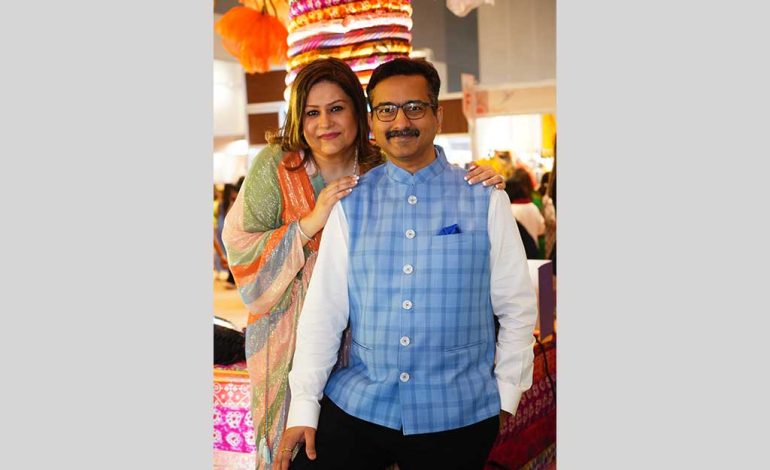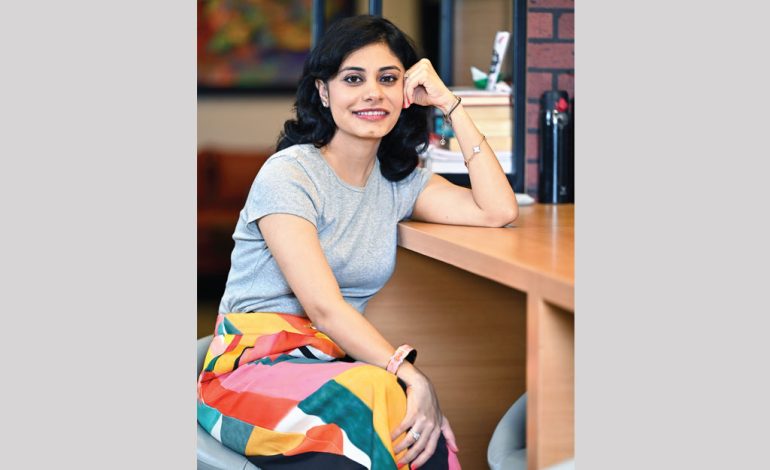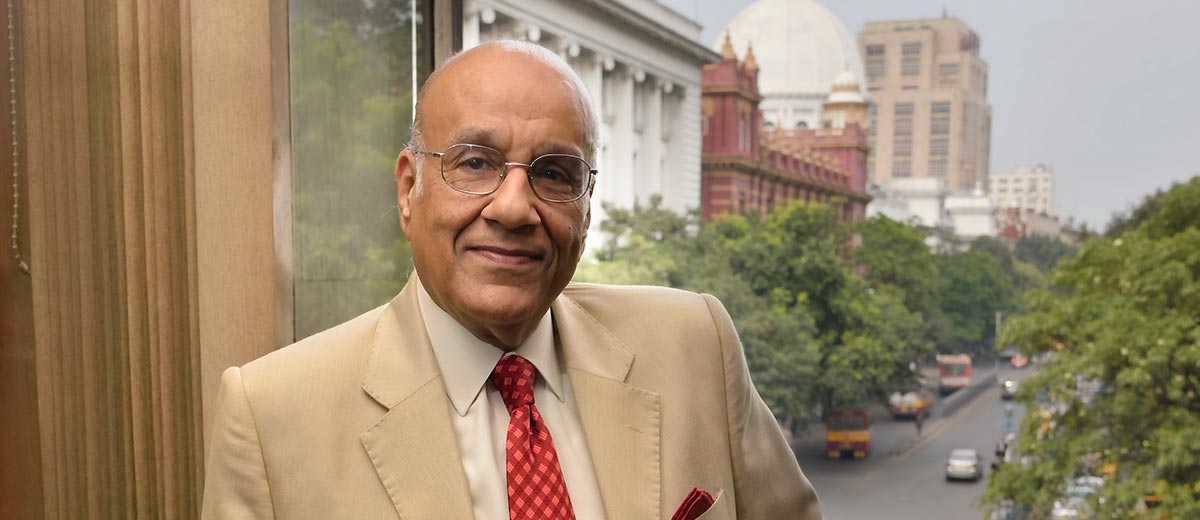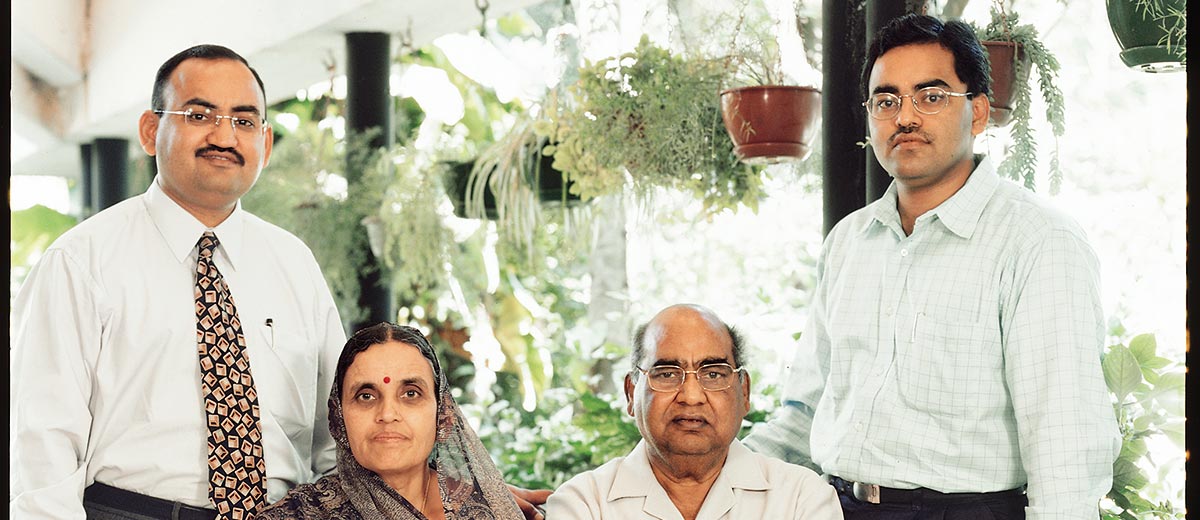
Breaking Taboos, Dispelling Myths
A strong desire to disrupt the negativity surrounding menstrual health in India drove Advaitesha Birla’s early start as a socio-preneur. At 18, she set up Ujaas, a nonprofit organisation that is actively championing women’s menstrual hygiene and creating a sustainable impact in the health and hygiene management sector.
She is the new face of India’s sociopreneurship. At an age when others are barely stepping out of the rebellious teenage phase-uncertain of what the future holds for them-Advaitesha Birla is working towards solving menstrual health issues in the hope of making India free of ‘period’ shaming. She broke out of her cocoon at 18 years of age to emerge as a new sociopreneur of India, creating an impact with her social initiative of fostering menstrual health.
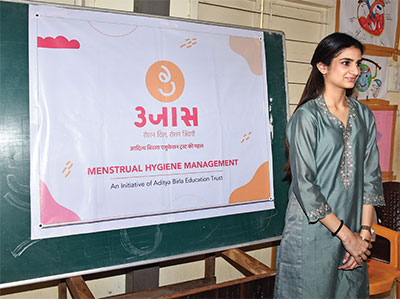
But then, Advaitesha Birla has no ordinary roots. She belongs to the illustrious Birla family and is the youngest daughter of leading industrialist Kumar Mangalam Birla (Chairman, Aditya Birla Group) and Neerja Birla (Chairperson, Aditya Birla Education Trust). With a strong lineage, the young girl harboured the passion to make an early start. Taking inspiration from her family’s social initiatives, she believed that it is one’s duty to give back to society and empower the less fortunate humans.
Changing the perception
 A young sociopreneur with a zeal to make a difference as an advocate of menstrual health and hygiene, Birla followed in her mother’s footsteps and set out to change people’s perception towards menstruation. “Although I always knew that menstruation was a taboo topic in India, it was not until recently that I understood the extent of it. So many women are not allowed to enter the kitchen during their periods. Many are forbidden fromtouching a bottle of pickle for the fear of the pickle turning bad if they touch it. There are places in our country where women have to live outside their villages during ‘that time of the month’. I realised that there is a lot of misinformation. One question that kept coming back to me was: how can a process that gives life be so condemned? I wanted to work in this arena with an aim to bring about real change in society.”
A young sociopreneur with a zeal to make a difference as an advocate of menstrual health and hygiene, Birla followed in her mother’s footsteps and set out to change people’s perception towards menstruation. “Although I always knew that menstruation was a taboo topic in India, it was not until recently that I understood the extent of it. So many women are not allowed to enter the kitchen during their periods. Many are forbidden fromtouching a bottle of pickle for the fear of the pickle turning bad if they touch it. There are places in our country where women have to live outside their villages during ‘that time of the month’. I realised that there is a lot of misinformation. One question that kept coming back to me was: how can a process that gives life be so condemned? I wanted to work in this arena with an aim to bring about real change in society.”

Women empowerment and gender equality are close to Birla’s heart and having closely seen the impact of age-old menstrual stigmas and outdated practices on the lives of those around her, she wanted to make a difference in this space. She thinks that normalising discussions on menstrual hygiene is the key to dealing with these problems. It helps to address the need for women to have access to proper menstrual products, as it enables them to conduct their daily activities and explore their potential without worries. More importantly, involving the community creates an environment where women are no longer stigmatised for a normal biological process. She understood that change needs to be driven from the grass-roots level to ensure overall transformation in the society.
Finding her own path
 Guided by her mother Neerja Birla who set up the Aditya Birla Education Trust that works in the field of creating awareness for mental health and education, Birla’s strong conviction in her own beliefs led her to find her calling in the field of menstrual health. Encouraged by her family, she set up Ujaas, an amalgamation of women’s health, empowerment and awareness. The NGO strives to create a positive conversation around menstrual health and hygiene practices in India. She sheds light on the initiative. “The fact that even in this modern age, two out of three women in India have no access to safe menstrual absorbents and resort to unhygienic and unsafe alternatives like mud, cloth and leaves is so distressing! And then, there are archaic stigmas attached to menstruation that have made it an unspeakable, taboo subject. So, in a very organic manner, menstrual health became my calling and Ujaas was started to make a difference.”
Guided by her mother Neerja Birla who set up the Aditya Birla Education Trust that works in the field of creating awareness for mental health and education, Birla’s strong conviction in her own beliefs led her to find her calling in the field of menstrual health. Encouraged by her family, she set up Ujaas, an amalgamation of women’s health, empowerment and awareness. The NGO strives to create a positive conversation around menstrual health and hygiene practices in India. She sheds light on the initiative. “The fact that even in this modern age, two out of three women in India have no access to safe menstrual absorbents and resort to unhygienic and unsafe alternatives like mud, cloth and leaves is so distressing! And then, there are archaic stigmas attached to menstruation that have made it an unspeakable, taboo subject. So, in a very organic manner, menstrual health became my calling and Ujaas was started to make a difference.”
Ujaas works in rural areas in communities and schools, with teachers and parents. “Our menstrual health programme operates through three verticals: awareness, distribution and sustainability. We conduct awareness workshops with adolescent girls and women in rural areas to give them necessary information about menstruation and hygiene. Through instructive sessions, games, etc., we deliver age-appropriate learning to our beneficiaries, thus covering an array of important topics ranging from the biological importance of menstruation to medical facts about it. Most importantly, we make focussed efforts towards dispelling the myths and stigmas surrounding it. We are trying to create a positive ecosystem for menstrual health,” says Birla.
Ujaas’ distribution vertical works towards providing sanitary napkins pro-bono to the beneficiaries, so that they do not have to resort to cheap unhygienic alternatives. “In this short period, we have distributed lakhs of sanitary pads free of cost. We also identify and employ sustainable interventions through our programme. By focussing on self-help groups, we tap into the vast potential of communities and train beneficiaries so that they can become our torch bearers. And we do not stop after a one-time intervention. We are passionate about delivering holistic solutions to communities and making our beneficiaries self-sufficient as far as menstrual hygiene is concerned,” she adds.
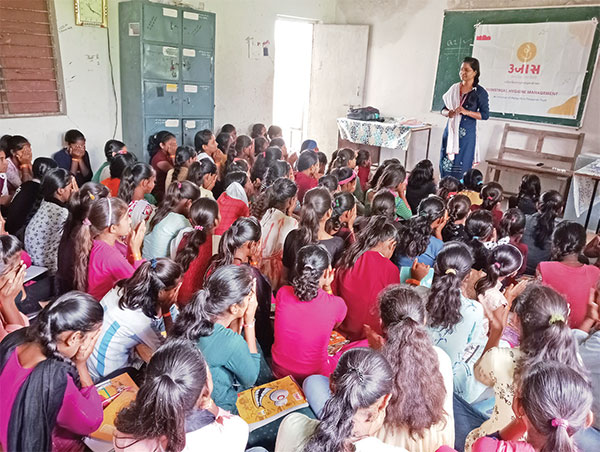
Creating a social movement
The ultimate goal of Ujaas is to reach out to people and impact their lives positively. “Menstrual health is a significant aspect of a woman’s life journey. On an average, women menstruate for about seven years of their lives. Therefore, being deprived of knowledge about menstrual health or access to safe and hygienic absorbents is a violation of basic human rights,” believes Birla. Ujaas is endeavouring to democratise menstrual health by spreading awareness, fighting the stigmas attached to it and using people’s voice to normalise menstruation. There are plans to expand its operations.
“We are taking our menstrual health programmes to the rural areas and attempting to change mindsets.We are finding a way around the resistance and getting women, young girls and their entire communities involved in normalising menstrual health. Every girl that learns about menstruation goes on to educate her family and other women in her community about it. By way of this spillover effect, our reach and impact have the potential to grow tenfold. The moment women stop feeling ashamed of their periods, the occurrence of period-related mental health issues will reduce. The moment they are able to explore their potential without worrying about their periods, it will empower them greatly. The day these goals are achieved, we will be that much closer to achieving gender equality,” she explains.
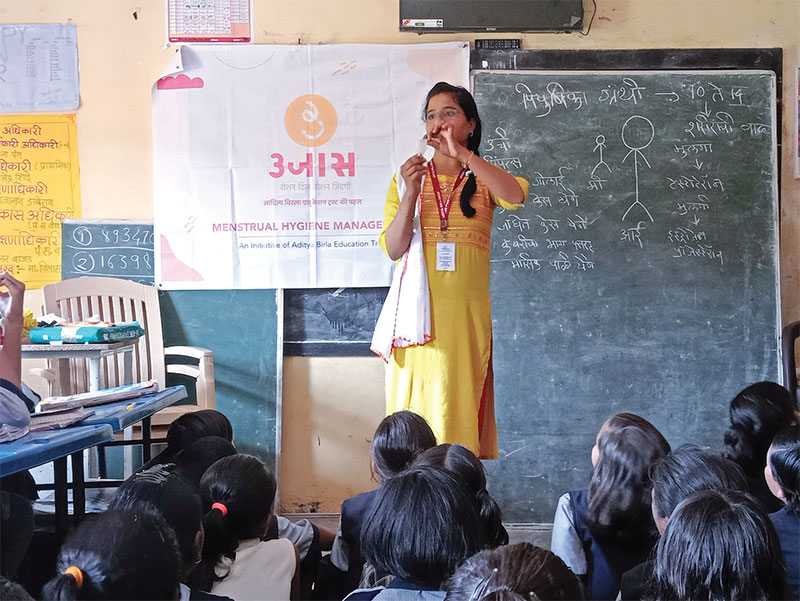
Fighting the stigma
Talking about the challenges, Birla says, “As per UNICEF, only 13 per cent of the girls in India know about menstruation before they get their first period. Many girls are reluctant to go to school during their periods. Some even drop out because there is worry regarding spotting and they fear being teased by boys, which has a deep impact on the psyche of girls. All of this can lead to serious mental health issues. People still believe in the archaic myths about menstruation and continue to practice the ancient rituals where women are made to feel ashamed and apologetic about their periods. Families and communities do not want to discuss the issue openly and choose to not send their adolescent girls to our awareness workshops!”
She adds, “Convincing people to let their daughters or wives participate is definitely a challenge. Also, in remote areas, without support from their families, girls lack the means of transportation to come to our workshop venues. This is where we have to make the effort to reach out to the elders in the family. Then, there is the language barrier. An understanding of local language and dialect and indigenous culture is important if we are to communicate with rural communities. You have to explain things to them in a manner that makes sense to them.” The answer to these challenges lies in dispelling the taboos associated with menstrual health. “The importance of making women feel comfortable with their womanhood and menstruation and ensuring its hygienic management is critical to their growth. No woman should have to use unsafe absorbents. In my opinion, sanitary napkins are every woman’s fundamental right, and it is our collective duty that every woman has access to them.” Ujaas has filed a petition urging the society to educate men on menstrual hygiene and solicit their support and understanding of sanitation.

Spreading her wings
Birla believes that people-whatever gender, race, class, or religion-are equal. “Each one of us has an equal right to lead a fulfilling life. That is why it is our responsibility to empower those who are less-fortunate or struggling with issues. A society can truly thrive only when it cares about the sustainable development and welfare of its people. I have chosen the arena of menstrual health and hygiene to contribute to the welfare of society. It is about women’s right to health. It is something that will not just help women but also their families, communities, and the society on the whole stands to benefit from a positive menstrual health ecosystem.”
A full-time university student pursuing psychology, Birla is expanding her horizons in the field of mental health. She envisions engineering collaborations between Ujaas and Mpower, the latter being her mother’s pet initiative under the Aditya Birla Education Trust. Mpower fights the stigma against mental health, creates awareness about it and provides clinical help to underprivileged individuals with mental concerns. Birla’s vision is particularly significant when one considers the fact that the stigma surrounding menstruation can often lead to period-related mental health issues.
Basking under family love
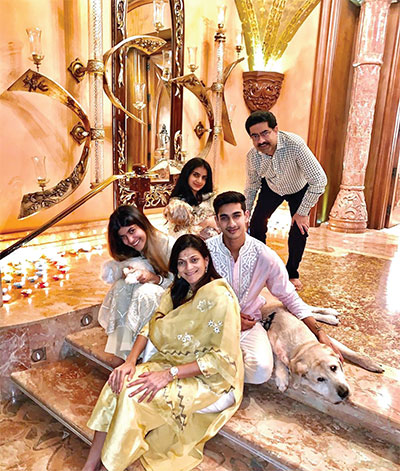
The youngest child of the Birla clan feels blessed to have had a grounded upbringing. “As proud as we are of our family’s legacy and achievements, my parents have always wanted us kids to think for ourselves and discover our own paths in life. They supported our dreams and passions, encouraged us to try new things and step outside our comfort zones. As clichéd as it sounds, but my parents gave my siblings and me-roots and wings,” says Birla.
She harbours special memories of her formative years with her parents and siblings Ananya and Aryaman. “Our family holidays have always been special and something that all of us look forward to. In fact, any moment that we all are together is special, even the small things like going for a drive and icecream, having a meal, or watching movies together.”
She adds, “Everyone in my family has been supportive of my decision to work in this field. Even now, each one of my family members is there to be a bouncing board for me. I often sound off my ideas to them. My mother made it even more special for me. It is my privilege that Ujaas is a part of Aditya Birla Education Trust that is doing so much work to bring about positive change. The icing on the cake is that she has been extremely involved in everything that happens in Ujaas. In fact, her guidance has helped us achieve so much in such a short span of time.”
The world is her oyster
Drawing comparisons between the person and the sociopreneur in her, Birla says, “The first thing that comes to mind is that I am like any other teenager. I am looking to learn, have fun, discover the world, and find my own path. On a personal level, I am extremely attached to my family and need to stay connected with them. I am also passionate about helping others and influencing a positive change in the world.”
Social initiatives, academic pursuits and personal commitments keep this young sociopreneur on her toes. “I try my best to stay as much involved as possible in the running of Ujaas. We have our weekly meetings that I look forward to and prepare extensively for. I am always thinking of what more we can do with our verticals and programmes. It does get tough to balance both academics and work, especially now that I am studying at a university abroad. But I believe that if you genuinely like doing something, you will always find time for it. Thankfully, we live in the digital age where ‘work-fromuniversity’ is easily possible.”
The Birla girl knows how to balance her time and relax. A trained dancer in kathak, she finds solace in spreading the melodious jingle of her ghungroos. “I indulge in the things I enjoy the most- dance, art, playing with my dogs, and most importantly, spending time with family and friends,” she concludes.

